2021届通用版高考英语新二轮语法巩固学案:《动词时态&语态》专题讲练 Word版含答案
文档属性
| 名称 | 2021届通用版高考英语新二轮语法巩固学案:《动词时态&语态》专题讲练 Word版含答案 | 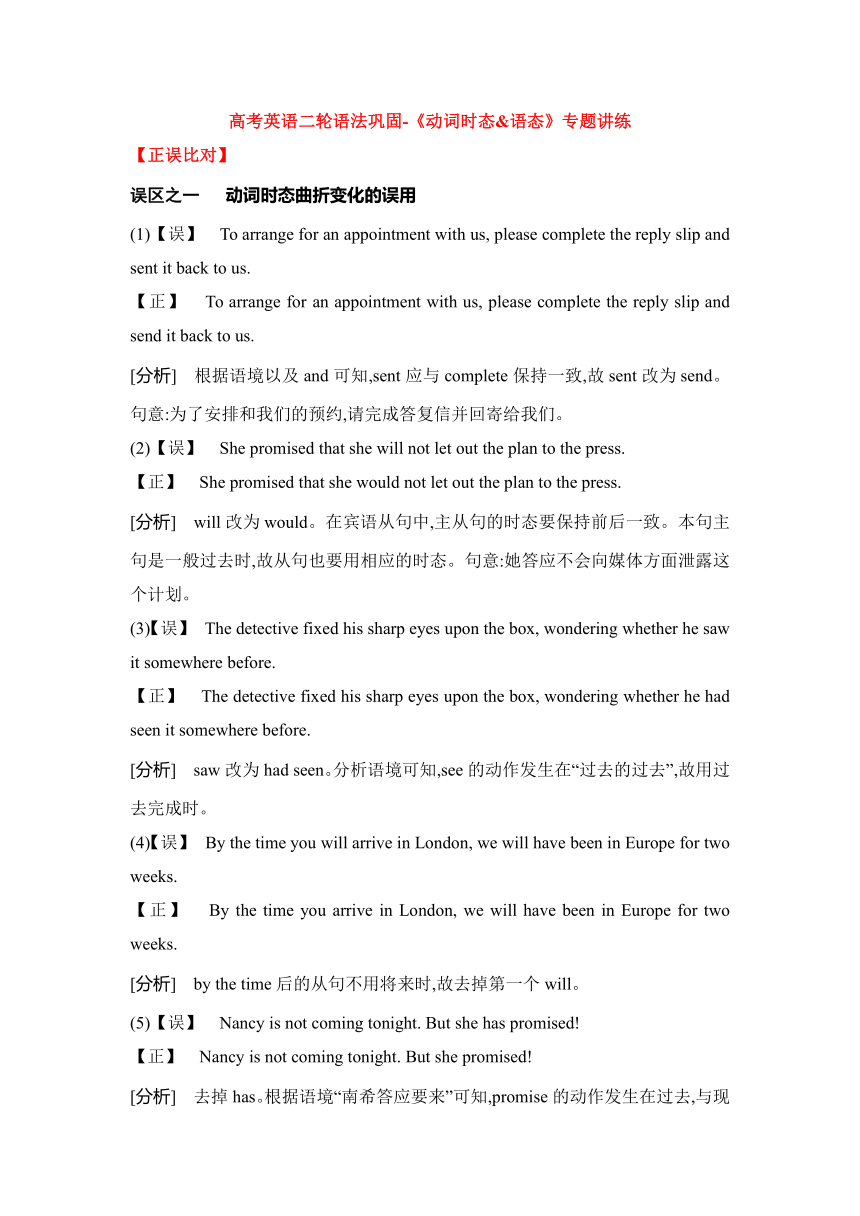 | |
| 格式 | doc | ||
| 文件大小 | 53.0KB | ||
| 资源类型 | 教案 | ||
| 版本资源 | 通用版 | ||
| 科目 | 英语 | ||
| 更新时间 | 2020-12-17 11:42:20 | ||
图片预览

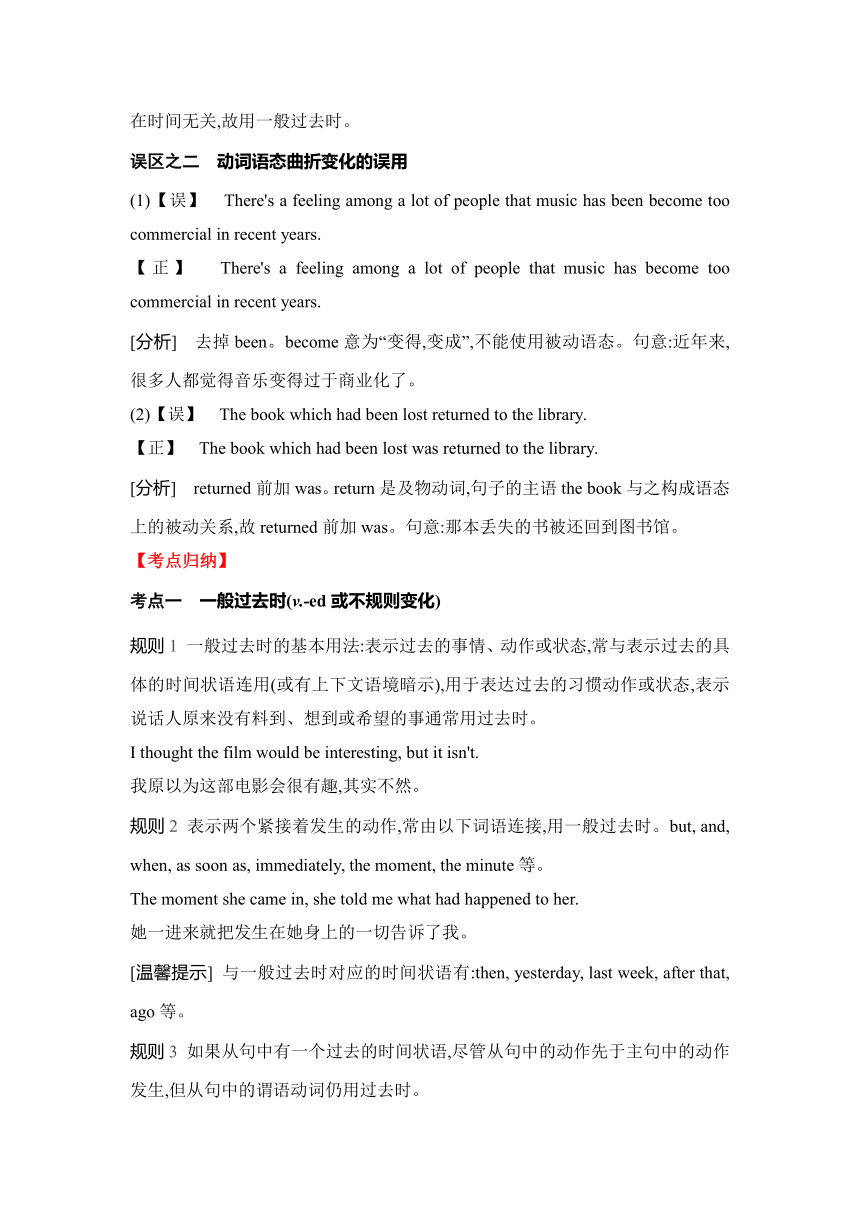
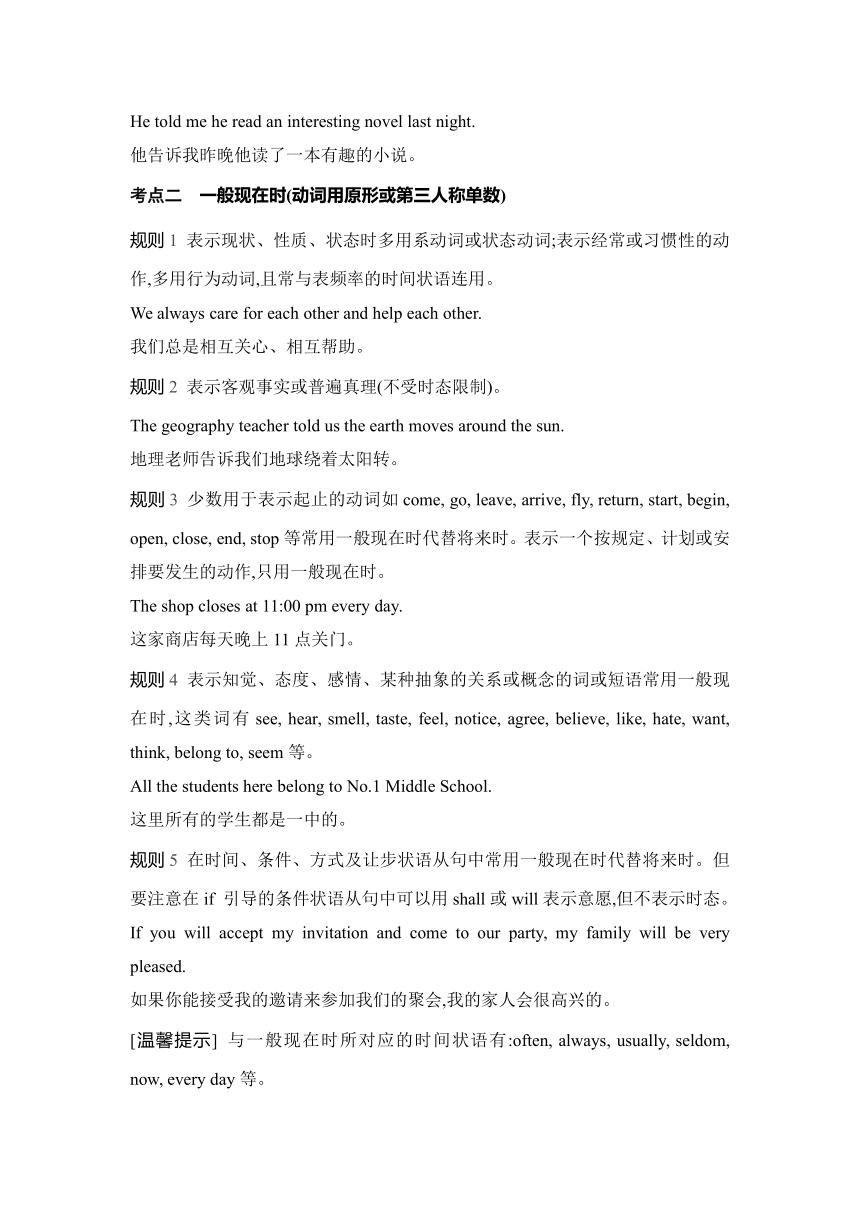
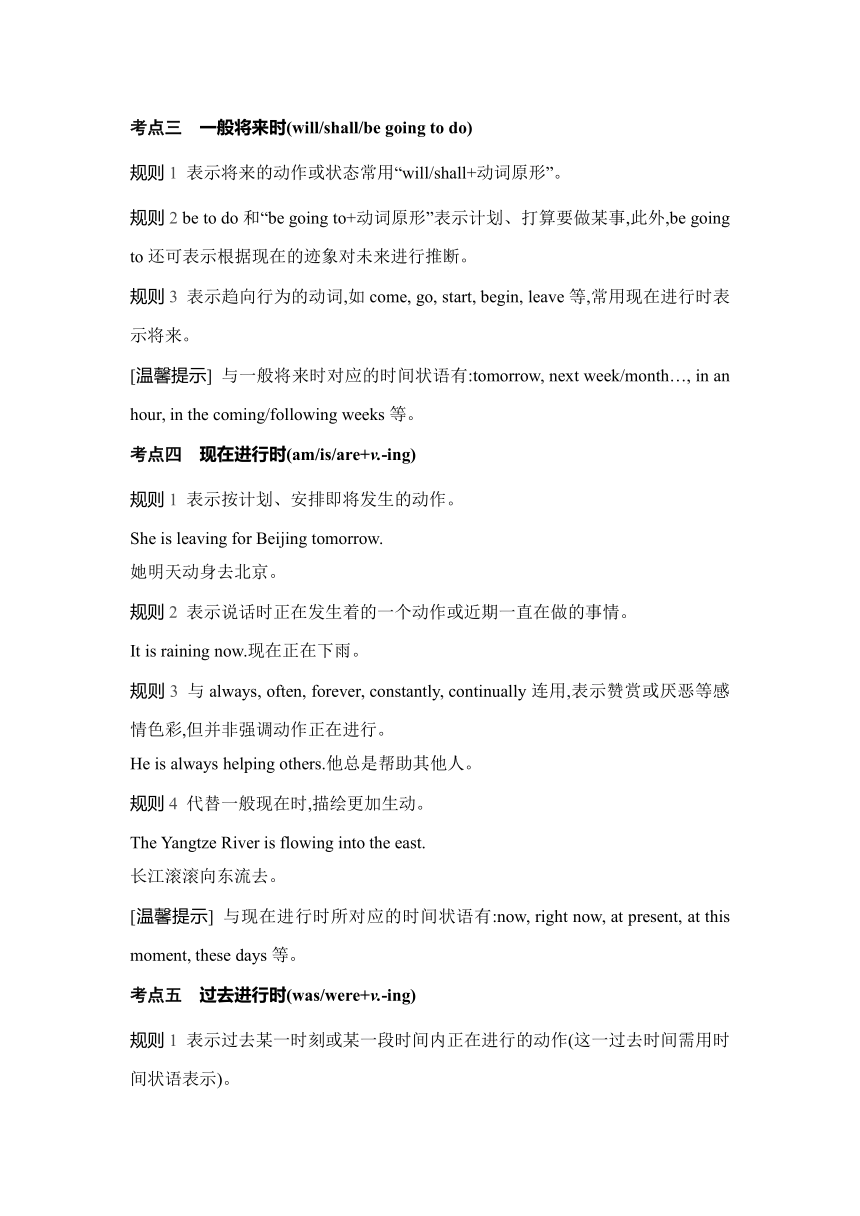
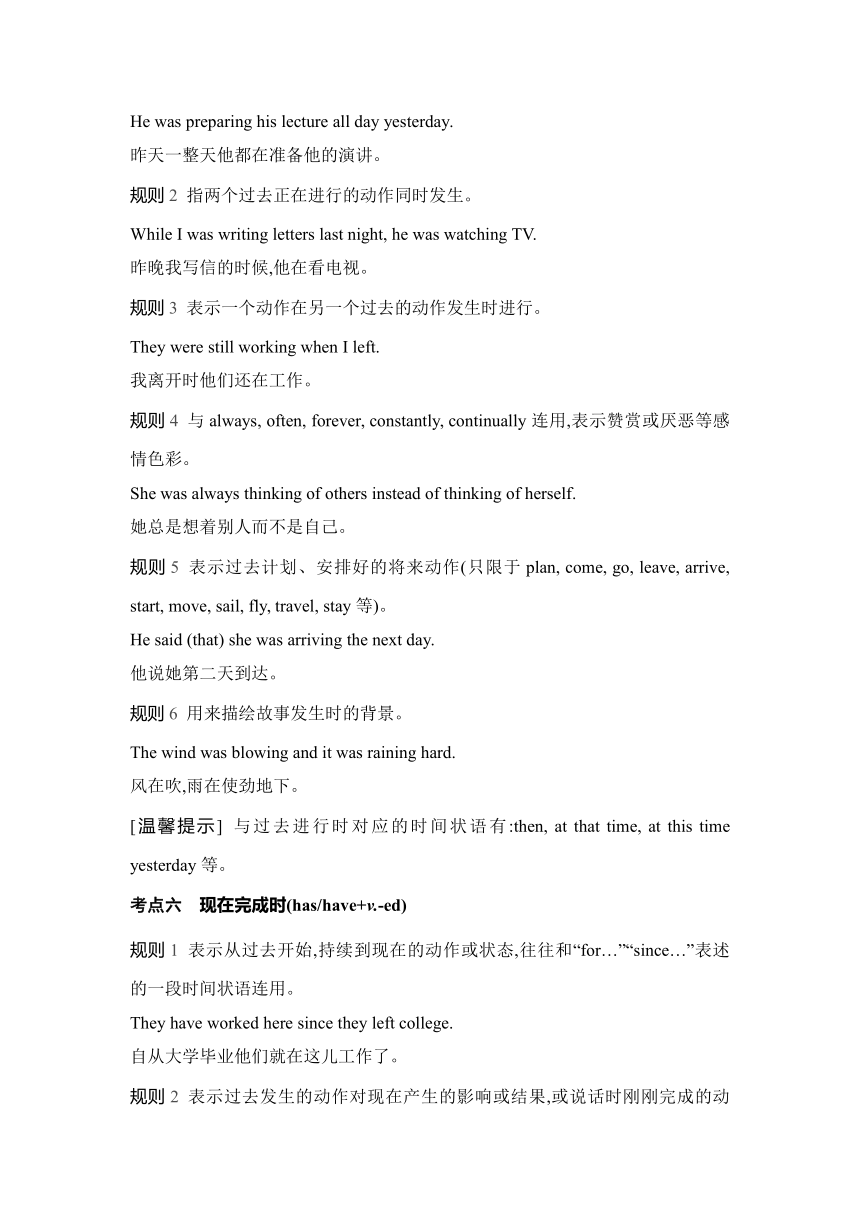
文档简介
高考英语二轮语法巩固-《动词时态&语态》专题讲练
【正误比对】
误区之一 动词时态曲折变化的误用
(1)【误】 To arrange for an appointment with us, please complete the reply slip and sent it back to us.
【正】 To arrange for an appointment with us, please complete the reply slip and send it back to us.
[分析] 根据语境以及and可知,sent应与complete保持一致,故sent改为send。句意:为了安排和我们的预约,请完成答复信并回寄给我们。
(2)【误】 She promised that she will not let out the plan to the press.
【正】 She promised that she would not let out the plan to the press.
[分析] will改为would。在宾语从句中,主从句的时态要保持前后一致。本句主句是一般过去时,故从句也要用相应的时态。句意:她答应不会向媒体方面泄露这个计划。
(3)【误】 The detective fixed his sharp eyes upon the box, wondering whether he saw it somewhere before.
【正】 The detective fixed his sharp eyes upon the box, wondering whether he had seen it somewhere before.
[分析] saw改为had seen。分析语境可知,see的动作发生在“过去的过去”,故用过去完成时。
(4)【误】 By the time you will arrive in London, we will have been in Europe for two weeks.
【正】 By the time you arrive in London, we will have been in Europe for two weeks.
[分析] by the time后的从句不用将来时,故去掉第一个will。
(5)【误】 Nancy is not coming tonight. But she has promised!
【正】 Nancy is not coming tonight. But she promised!
[分析] 去掉has。根据语境“南希答应要来”可知,promise的动作发生在过去,与现在时间无关,故用一般过去时。
误区之二 动词语态曲折变化的误用
(1)【误】 There's a feeling among a lot of people that music has been become too commercial in recent years.
【正】 There's a feeling among a lot of people that music has become too commercial in recent years.
[分析] 去掉been。become意为“变得,变成”,不能使用被动语态。句意:近年来,很多人都觉得音乐变得过于商业化了。
(2)【误】 The book which had been lost returned to the library.
【正】 The book which had been lost was returned to the library.
[分析] returned前加was。return是及物动词,句子的主语the book与之构成语态上的被动关系,故returned前加was。句意:那本丢失的书被还回到图书馆。
【考点归纳】
考点一 一般过去时(v.-ed或不规则变化)
规则1 一般过去时的基本用法:表示过去的事情、动作或状态,常与表示过去的具体的时间状语连用(或有上下文语境暗示),用于表达过去的习惯动作或状态,表示说话人原来没有料到、想到或希望的事通常用过去时。
I thought the film would be interesting, but it isn't.
我原以为这部电影会很有趣,其实不然。
规则2 表示两个紧接着发生的动作,常由以下词语连接,用一般过去时。but, and, when, as soon as, immediately, the moment, the minute等。
The moment she came in, she told me what had happened to her.
她一进来就把发生在她身上的一切告诉了我。
[温馨提示] 与一般过去时对应的时间状语有:then, yesterday, last week, after that, ago等。
规则3 如果从句中有一个过去的时间状语,尽管从句中的动作先于主句中的动作发生,但从句中的谓语动词仍用过去时。
He told me he read an interesting novel last night.
他告诉我昨晚他读了一本有趣的小说。
考点二 一般现在时(动词用原形或第三人称单数)
规则1 表示现状、性质、状态时多用系动词或状态动词;表示经常或习惯性的动作,多用行为动词,且常与表频率的时间状语连用。
We always care for each other and help each other.
我们总是相互关心、相互帮助。
规则2 表示客观事实或普遍真理(不受时态限制)。
The geography teacher told us the earth moves around the sun.
地理老师告诉我们地球绕着太阳转。
规则3 少数用于表示起止的动词如come, go, leave, arrive, fly, return, start, begin, open, close, end, stop等常用一般现在时代替将来时。表示一个按规定、计划或安排要发生的动作,只用一般现在时。
The shop closes at 11:00 pm every day.
这家商店每天晚上11点关门。
规则4 表示知觉、态度、感情、某种抽象的关系或概念的词或短语常用一般现在时,这类词有see, hear, smell, taste, feel, notice, agree, believe, like, hate, want, think, belong to, seem等。
All the students here belong to No.1 Middle School.
这里所有的学生都是一中的。
规则5 在时间、条件、方式及让步状语从句中常用一般现在时代替将来时。但要注意在if 引导的条件状语从句中可以用shall或will表示意愿,但不表示时态。
If you will accept my invitation and come to our party, my family will be very pleased.
如果你能接受我的邀请来参加我们的聚会,我的家人会很高兴的。
[温馨提示] 与一般现在时所对应的时间状语有:often, always, usually, seldom, now, every day等。
考点三 一般将来时(will/shall/be going to do)
规则1 表示将来的动作或状态常用“will/shall+动词原形”。
规则2 be to do和“be going to+动词原形”表示计划、打算要做某事,此外,be going to还可表示根据现在的迹象对未来进行推断。
规则3 表示趋向行为的动词,如come, go, start, begin, leave等,常用现在进行时表示将来。
[温馨提示] 与一般将来时对应的时间状语有:tomorrow, next week/month…, in an hour, in the coming/following weeks等。
考点四 现在进行时(am/is/are+v.-ing)
规则1 表示按计划、安排即将发生的动作。
She is leaving for Beijing tomorrow.
她明天动身去北京。
规则2 表示说话时正在发生着的一个动作或近期一直在做的事情。
It is raining now.现在正在下雨。
规则3 与always, often, forever, constantly, continually连用,表示赞赏或厌恶等感彩,但并非强调动作正在进行。
He is always helping others.他总是帮助其他人。
规则4 代替一般现在时,描绘更加生动。
The Yangtze River is flowing into the east.
长江滚滚向东流去。
[温馨提示] 与现在进行时所对应的时间状语有:now, right now, at present, at this moment, these days等。
考点五 过去进行时(was/were+v.-ing)
规则1 表示过去某一时刻或某一段时间内正在进行的动作(这一过去时间需用时间状语表示)。
He was preparing his lecture all day yesterday.
昨天一整天他都在准备他的演讲。
规则2 指两个过去正在进行的动作同时发生。
While I was writing letters last night, he was watching TV.
昨晚我写信的时候,他在看电视。
规则3 表示一个动作在另一个过去的动作发生时进行。
They were still working when I left.
我离开时他们还在工作。
规则4 与always, often, forever, constantly, continually连用,表示赞赏或厌恶等感彩。
She was always thinking of others instead of thinking of herself.
她总是想着别人而不是自己。
规则5 表示过去计划、安排好的将来动作(只限于plan, come, go, leave, arrive, start, move, sail, fly, travel, stay等)。
He said (that) she was arriving the next day.
他说她第二天到达。
规则6 用来描绘故事发生时的背景。
The wind was blowing and it was raining hard.
风在吹,雨在使劲地下。
[温馨提示] 与过去进行时对应的时间状语有:then, at that time, at this time yesterday等。
考点六 现在完成时(has/have+v.-ed)
规则1 表示从过去开始,持续到现在的动作或状态,往往和“for…”“since…”表述的一段时间状语连用。
They have worked here since they left college.
自从大学毕业他们就在这儿工作了。
规则2 表示过去发生的动作对现在产生的影响或结果,或说话时刚刚完成的动作。
I have finished the report.
我已经做好了报告。
规则3 在时间状语从句、条件状语从句或让步状语从句中表达到将来某时已经完成的动作。
We'll start at six if it has stopped raining by then.
如果那时雨停了,我们就六点出发。
规则4 表示“曾经到过某地(人已回来)”用have/has been to;表示“到某地去了(还未回来)”用have/has gone to。
①—Where is Li Hua?
—He has gone to the reading room.
“李华在哪里?”
“他去了阅览室。”
②—She knows a lot about Shanghai.
—She has been there for two years.
“她对于上海了解很多。”
“她在那儿待了两年。”
规则5 短暂动词(即瞬间动词)及短语join, lose, buy, borrow, lend, leave, go, come, arrive, die, marry, finish, complete, begin, start, break out, take part in等,在完成时态中,其肯定式不能和表示一段时间的状语连用。
He has joined the army for three years.(×)
He joined the army three years ago. (√)
He has been in the army for three years. (√)
It is/has been three years since he joined the army. (√)
[温馨提示] 与现在完成时对应的时间状语有: recently, lately, up to/till now, so far, in the past/last few months/years…, for+时间段, “since+时间点”等。
考点七 过去完成时(had+v.-ed)
规则1 表示从过去某一时刻开始一直延续到另一过去时刻的动作或状态,即“从过去到过去”。
When Jack arrived, Mary had been away for almost an hour.
当杰克到达时,玛丽已经离开快一个小时了。
规则2 在by, by the end of, by the time, until, before后接表示过去某一时间的短语或从句,其谓语动词则表示在某一时刻或某一动作之前已经完成了的动作,即“过去的过去”。
By the end of last year, we had produced 20,000 cars.
到去年年底,我们已经生产了20 000辆汽车。
规则3 在“hardly (scarcely)…when…,no sooner…than…”句型结构中,主句用过去完成时,从句用一般过去时,意思为“一……就……”。
We had no sooner been seated than the bus started.→No sooner had we been seated than the bus started.
我们刚落座公共汽车就开动了。
[温馨提示] 与过去完成时对应的时间状语有:before, by the end of last month/year…等。
规则4 表示过去未曾实现的希望、打算、意图、诺言等。常用had hoped/planned/meant/intended/thought/wanted/expected等或用上述动词的过去式接不定式的完成式表示,即“hoped/planned…+to have done”。
I had planned to send him a Christmas card, but I forgot to do so.
我本来打算寄给他一张圣诞卡片的,但我忘了寄了。
考点八 过去将来时(would do, was/were going to do)
规则1 表示从过去某时看来将要发生的动作、状态或过去的意图打算(主要用于宾语从句中)。
She was sure she would succeed.
她确信她会成功。
规则2 表示过去经常发生的动作。
When he was young, he would go swimming.
当他年轻的时候,他常常去游泳。
[温馨提示] 与过去将来时对应的时间状语有:the following month, the next week等。
考点九 动词被动语态的构成(以ask为例)
常用被
动语态 构成
(以ask为例)
常用被
动语态 构成
(以ask为例)
1 一般
现在时 am/is/are
asked 6 过去
进行时 was/were
being asked
2 一般
过去时 was/were
asked 7 现在
完成时 have/has
been asked
3 一般
将来时 shall/will
be asked 8 过去
完成时 had been
asked
4 过去
将来时 would be
asked 9 将来
完成时 will/shall have
been asked
5 现在
进行时 am/is/are
being asked 10 含有情态动词
的被动语态 can/must/may/
should/…
be asked
[温馨提示] 主动形式表被动意义的几类动词。
①“系动词look,sound,feel,smell,taste,appear,seem,go,prove,turn,stay,become,fall,get,
grow,keep+形容词/名词”构成系表结构。
His plan proved (to be) practical. 他的计划被证明符合实际。
②表示主语的某种属性特征的不及物动词,如read,write,sell,wash,clean,wear,open,cook,lock,shut等,用主动形式表示被动含义。
His books sell well,so they will be sold out soon.
他的书很畅销,因此很快就会卖光。
③动词want,need,require,deserve后接不定式的被动形式或动名词的主动形式,意义相同。
As a result of the serious flood,two thirds of the buildings in the area deserve repairing/to be repaired.
由于严重的洪灾,这个地区三分之二的建筑需要修缮。
【实战演练】
【单句语法填空】
1. Sarah (tell) that she could be Britain's new supermodel, earning a million dollars in the next year. ?
2.But at the moment, school (come) first. I don't want to get too absorbed in modelling. ?
3. When fat and salt (remove) from food, the food tastes as if it is missing something.?
4. I (allow) to get up close to these cute animals at the 600-acre centre.?
5.The giant panda (love) by people throughout the world.?
6. I wasn't able to hide my eagerness when I (ask), “What do you wish me to do now?”?
7. This is the first time that our whole class (go) out together for a picnic.?
8. If their marketing plans succeed, they (increase)their sales by 20 per cent.?
9. The real reason why prices (be),and still are, too high is complex, and no short discussion can satisfactorily explain this problem. ?
10. More expressways (build) in Sichuan soon to promote the local economy.?
11. Mr White (teach) in our school for nearly forty years before he retired last month.?
12. That was the first time that I (be) to Hong Kong so I had great difficulty finding the hotel.?
13. I (watch) TV alone in the living room when I suddenly heard a crack upstairs.?
14. It is the first time that I (enjoy) this kind of mooncake.?
15. At a young age, he (move) to Spain and now plays professionally for the FC Barcelona.?
16. Marty (work) really hard on his book and he thinks he'll have finished it by Friday.?
17. Close the door of fear behind you,and you (see) the door of faith open before you. ?
18. Despite the previous rounds of talks, no agreement (reach) so far by the two sides. ?
19. I didn't go to the lecture yesterday afternoon. I (do) my homework then.?
20. Professor Williams keeps telling his students that the future (belong) to the well-educated.?
【单句改错】
1. When summer came,they will invite their students to pick the fresh vegetables!
2.She was so interested in the book that she read it for three hours before she realized it.
3.We get up early in the morning. Dad cleaned the house, and then went shopping.
4.While they chat,my father would lift my sister and me up to sit on the top of the fridge.
5.It is always crowded with customers at meal times. Some people even had to wait outside.
【语篇语法填空】
The Sydney Opera House has a very interesting history. 1. all started in the 1960s, when the Sydney Symphony Orchestra had nowhere to play. The orchestra's conductor, Eugene Goossens, asked the Australian government to think about building a place and the government 2. (final) agreed to build an opera house in 1956.?
The government held an 3. (nation) competition to find a design for the opera house. Many of the designers from around the world 4. entered the competition were famous, but the design of an unknown Danish architect 5. (name) J????rn Utzon was chosen as the 6. (win).?
While drawing up the plans, Utzon remembered the temples he 7. (see) in Mexico before and used them as his inspiration for the base 8. the opera house in Sydney. The building of the opera house began in 1958, but Utzon had still not finished his plans. He did not like his first plan as the concrete roof shells did not work. His new idea was 9. (make) the shell shapes on the roof into the shape of a ball. That way, the same ball mould could be used for several roof 10. (part). In 1962, the government agreed to the new ball roof idea. The building was completed and in November 1973, the Sydney Opera House was opened by Queen Elizabeth Ⅱ.?
参考答案:
【单句语法填空】
1.has been told/was told
2.comes
3.are removed
4.was allowed
5.is loved
6.asked
7.have gone
8.will increase
9.were
10.will be built
11.had taught
12.had been
13.was watching
14.have enjoyed
15.moved
16.has been working
17.will see
18.has been reached
19.was doing
20.belongs
【单句改错】
1.came改为comes
2.read前加had
3.get改为got
4. chat改为chatted
5.had改为have
【语篇语法填空】
1. It
2. finally
3. international
4. who/that
5. named
6. winner
7. had seen
8. of
9. to make
10. parts
【正误比对】
误区之一 动词时态曲折变化的误用
(1)【误】 To arrange for an appointment with us, please complete the reply slip and sent it back to us.
【正】 To arrange for an appointment with us, please complete the reply slip and send it back to us.
[分析] 根据语境以及and可知,sent应与complete保持一致,故sent改为send。句意:为了安排和我们的预约,请完成答复信并回寄给我们。
(2)【误】 She promised that she will not let out the plan to the press.
【正】 She promised that she would not let out the plan to the press.
[分析] will改为would。在宾语从句中,主从句的时态要保持前后一致。本句主句是一般过去时,故从句也要用相应的时态。句意:她答应不会向媒体方面泄露这个计划。
(3)【误】 The detective fixed his sharp eyes upon the box, wondering whether he saw it somewhere before.
【正】 The detective fixed his sharp eyes upon the box, wondering whether he had seen it somewhere before.
[分析] saw改为had seen。分析语境可知,see的动作发生在“过去的过去”,故用过去完成时。
(4)【误】 By the time you will arrive in London, we will have been in Europe for two weeks.
【正】 By the time you arrive in London, we will have been in Europe for two weeks.
[分析] by the time后的从句不用将来时,故去掉第一个will。
(5)【误】 Nancy is not coming tonight. But she has promised!
【正】 Nancy is not coming tonight. But she promised!
[分析] 去掉has。根据语境“南希答应要来”可知,promise的动作发生在过去,与现在时间无关,故用一般过去时。
误区之二 动词语态曲折变化的误用
(1)【误】 There's a feeling among a lot of people that music has been become too commercial in recent years.
【正】 There's a feeling among a lot of people that music has become too commercial in recent years.
[分析] 去掉been。become意为“变得,变成”,不能使用被动语态。句意:近年来,很多人都觉得音乐变得过于商业化了。
(2)【误】 The book which had been lost returned to the library.
【正】 The book which had been lost was returned to the library.
[分析] returned前加was。return是及物动词,句子的主语the book与之构成语态上的被动关系,故returned前加was。句意:那本丢失的书被还回到图书馆。
【考点归纳】
考点一 一般过去时(v.-ed或不规则变化)
规则1 一般过去时的基本用法:表示过去的事情、动作或状态,常与表示过去的具体的时间状语连用(或有上下文语境暗示),用于表达过去的习惯动作或状态,表示说话人原来没有料到、想到或希望的事通常用过去时。
I thought the film would be interesting, but it isn't.
我原以为这部电影会很有趣,其实不然。
规则2 表示两个紧接着发生的动作,常由以下词语连接,用一般过去时。but, and, when, as soon as, immediately, the moment, the minute等。
The moment she came in, she told me what had happened to her.
她一进来就把发生在她身上的一切告诉了我。
[温馨提示] 与一般过去时对应的时间状语有:then, yesterday, last week, after that, ago等。
规则3 如果从句中有一个过去的时间状语,尽管从句中的动作先于主句中的动作发生,但从句中的谓语动词仍用过去时。
He told me he read an interesting novel last night.
他告诉我昨晚他读了一本有趣的小说。
考点二 一般现在时(动词用原形或第三人称单数)
规则1 表示现状、性质、状态时多用系动词或状态动词;表示经常或习惯性的动作,多用行为动词,且常与表频率的时间状语连用。
We always care for each other and help each other.
我们总是相互关心、相互帮助。
规则2 表示客观事实或普遍真理(不受时态限制)。
The geography teacher told us the earth moves around the sun.
地理老师告诉我们地球绕着太阳转。
规则3 少数用于表示起止的动词如come, go, leave, arrive, fly, return, start, begin, open, close, end, stop等常用一般现在时代替将来时。表示一个按规定、计划或安排要发生的动作,只用一般现在时。
The shop closes at 11:00 pm every day.
这家商店每天晚上11点关门。
规则4 表示知觉、态度、感情、某种抽象的关系或概念的词或短语常用一般现在时,这类词有see, hear, smell, taste, feel, notice, agree, believe, like, hate, want, think, belong to, seem等。
All the students here belong to No.1 Middle School.
这里所有的学生都是一中的。
规则5 在时间、条件、方式及让步状语从句中常用一般现在时代替将来时。但要注意在if 引导的条件状语从句中可以用shall或will表示意愿,但不表示时态。
If you will accept my invitation and come to our party, my family will be very pleased.
如果你能接受我的邀请来参加我们的聚会,我的家人会很高兴的。
[温馨提示] 与一般现在时所对应的时间状语有:often, always, usually, seldom, now, every day等。
考点三 一般将来时(will/shall/be going to do)
规则1 表示将来的动作或状态常用“will/shall+动词原形”。
规则2 be to do和“be going to+动词原形”表示计划、打算要做某事,此外,be going to还可表示根据现在的迹象对未来进行推断。
规则3 表示趋向行为的动词,如come, go, start, begin, leave等,常用现在进行时表示将来。
[温馨提示] 与一般将来时对应的时间状语有:tomorrow, next week/month…, in an hour, in the coming/following weeks等。
考点四 现在进行时(am/is/are+v.-ing)
规则1 表示按计划、安排即将发生的动作。
She is leaving for Beijing tomorrow.
她明天动身去北京。
规则2 表示说话时正在发生着的一个动作或近期一直在做的事情。
It is raining now.现在正在下雨。
规则3 与always, often, forever, constantly, continually连用,表示赞赏或厌恶等感彩,但并非强调动作正在进行。
He is always helping others.他总是帮助其他人。
规则4 代替一般现在时,描绘更加生动。
The Yangtze River is flowing into the east.
长江滚滚向东流去。
[温馨提示] 与现在进行时所对应的时间状语有:now, right now, at present, at this moment, these days等。
考点五 过去进行时(was/were+v.-ing)
规则1 表示过去某一时刻或某一段时间内正在进行的动作(这一过去时间需用时间状语表示)。
He was preparing his lecture all day yesterday.
昨天一整天他都在准备他的演讲。
规则2 指两个过去正在进行的动作同时发生。
While I was writing letters last night, he was watching TV.
昨晚我写信的时候,他在看电视。
规则3 表示一个动作在另一个过去的动作发生时进行。
They were still working when I left.
我离开时他们还在工作。
规则4 与always, often, forever, constantly, continually连用,表示赞赏或厌恶等感彩。
She was always thinking of others instead of thinking of herself.
她总是想着别人而不是自己。
规则5 表示过去计划、安排好的将来动作(只限于plan, come, go, leave, arrive, start, move, sail, fly, travel, stay等)。
He said (that) she was arriving the next day.
他说她第二天到达。
规则6 用来描绘故事发生时的背景。
The wind was blowing and it was raining hard.
风在吹,雨在使劲地下。
[温馨提示] 与过去进行时对应的时间状语有:then, at that time, at this time yesterday等。
考点六 现在完成时(has/have+v.-ed)
规则1 表示从过去开始,持续到现在的动作或状态,往往和“for…”“since…”表述的一段时间状语连用。
They have worked here since they left college.
自从大学毕业他们就在这儿工作了。
规则2 表示过去发生的动作对现在产生的影响或结果,或说话时刚刚完成的动作。
I have finished the report.
我已经做好了报告。
规则3 在时间状语从句、条件状语从句或让步状语从句中表达到将来某时已经完成的动作。
We'll start at six if it has stopped raining by then.
如果那时雨停了,我们就六点出发。
规则4 表示“曾经到过某地(人已回来)”用have/has been to;表示“到某地去了(还未回来)”用have/has gone to。
①—Where is Li Hua?
—He has gone to the reading room.
“李华在哪里?”
“他去了阅览室。”
②—She knows a lot about Shanghai.
—She has been there for two years.
“她对于上海了解很多。”
“她在那儿待了两年。”
规则5 短暂动词(即瞬间动词)及短语join, lose, buy, borrow, lend, leave, go, come, arrive, die, marry, finish, complete, begin, start, break out, take part in等,在完成时态中,其肯定式不能和表示一段时间的状语连用。
He has joined the army for three years.(×)
He joined the army three years ago. (√)
He has been in the army for three years. (√)
It is/has been three years since he joined the army. (√)
[温馨提示] 与现在完成时对应的时间状语有: recently, lately, up to/till now, so far, in the past/last few months/years…, for+时间段, “since+时间点”等。
考点七 过去完成时(had+v.-ed)
规则1 表示从过去某一时刻开始一直延续到另一过去时刻的动作或状态,即“从过去到过去”。
When Jack arrived, Mary had been away for almost an hour.
当杰克到达时,玛丽已经离开快一个小时了。
规则2 在by, by the end of, by the time, until, before后接表示过去某一时间的短语或从句,其谓语动词则表示在某一时刻或某一动作之前已经完成了的动作,即“过去的过去”。
By the end of last year, we had produced 20,000 cars.
到去年年底,我们已经生产了20 000辆汽车。
规则3 在“hardly (scarcely)…when…,no sooner…than…”句型结构中,主句用过去完成时,从句用一般过去时,意思为“一……就……”。
We had no sooner been seated than the bus started.→No sooner had we been seated than the bus started.
我们刚落座公共汽车就开动了。
[温馨提示] 与过去完成时对应的时间状语有:before, by the end of last month/year…等。
规则4 表示过去未曾实现的希望、打算、意图、诺言等。常用had hoped/planned/meant/intended/thought/wanted/expected等或用上述动词的过去式接不定式的完成式表示,即“hoped/planned…+to have done”。
I had planned to send him a Christmas card, but I forgot to do so.
我本来打算寄给他一张圣诞卡片的,但我忘了寄了。
考点八 过去将来时(would do, was/were going to do)
规则1 表示从过去某时看来将要发生的动作、状态或过去的意图打算(主要用于宾语从句中)。
She was sure she would succeed.
她确信她会成功。
规则2 表示过去经常发生的动作。
When he was young, he would go swimming.
当他年轻的时候,他常常去游泳。
[温馨提示] 与过去将来时对应的时间状语有:the following month, the next week等。
考点九 动词被动语态的构成(以ask为例)
常用被
动语态 构成
(以ask为例)
常用被
动语态 构成
(以ask为例)
1 一般
现在时 am/is/are
asked 6 过去
进行时 was/were
being asked
2 一般
过去时 was/were
asked 7 现在
完成时 have/has
been asked
3 一般
将来时 shall/will
be asked 8 过去
完成时 had been
asked
4 过去
将来时 would be
asked 9 将来
完成时 will/shall have
been asked
5 现在
进行时 am/is/are
being asked 10 含有情态动词
的被动语态 can/must/may/
should/…
be asked
[温馨提示] 主动形式表被动意义的几类动词。
①“系动词look,sound,feel,smell,taste,appear,seem,go,prove,turn,stay,become,fall,get,
grow,keep+形容词/名词”构成系表结构。
His plan proved (to be) practical. 他的计划被证明符合实际。
②表示主语的某种属性特征的不及物动词,如read,write,sell,wash,clean,wear,open,cook,lock,shut等,用主动形式表示被动含义。
His books sell well,so they will be sold out soon.
他的书很畅销,因此很快就会卖光。
③动词want,need,require,deserve后接不定式的被动形式或动名词的主动形式,意义相同。
As a result of the serious flood,two thirds of the buildings in the area deserve repairing/to be repaired.
由于严重的洪灾,这个地区三分之二的建筑需要修缮。
【实战演练】
【单句语法填空】
1. Sarah (tell) that she could be Britain's new supermodel, earning a million dollars in the next year. ?
2.But at the moment, school (come) first. I don't want to get too absorbed in modelling. ?
3. When fat and salt (remove) from food, the food tastes as if it is missing something.?
4. I (allow) to get up close to these cute animals at the 600-acre centre.?
5.The giant panda (love) by people throughout the world.?
6. I wasn't able to hide my eagerness when I (ask), “What do you wish me to do now?”?
7. This is the first time that our whole class (go) out together for a picnic.?
8. If their marketing plans succeed, they (increase)their sales by 20 per cent.?
9. The real reason why prices (be),and still are, too high is complex, and no short discussion can satisfactorily explain this problem. ?
10. More expressways (build) in Sichuan soon to promote the local economy.?
11. Mr White (teach) in our school for nearly forty years before he retired last month.?
12. That was the first time that I (be) to Hong Kong so I had great difficulty finding the hotel.?
13. I (watch) TV alone in the living room when I suddenly heard a crack upstairs.?
14. It is the first time that I (enjoy) this kind of mooncake.?
15. At a young age, he (move) to Spain and now plays professionally for the FC Barcelona.?
16. Marty (work) really hard on his book and he thinks he'll have finished it by Friday.?
17. Close the door of fear behind you,and you (see) the door of faith open before you. ?
18. Despite the previous rounds of talks, no agreement (reach) so far by the two sides. ?
19. I didn't go to the lecture yesterday afternoon. I (do) my homework then.?
20. Professor Williams keeps telling his students that the future (belong) to the well-educated.?
【单句改错】
1. When summer came,they will invite their students to pick the fresh vegetables!
2.She was so interested in the book that she read it for three hours before she realized it.
3.We get up early in the morning. Dad cleaned the house, and then went shopping.
4.While they chat,my father would lift my sister and me up to sit on the top of the fridge.
5.It is always crowded with customers at meal times. Some people even had to wait outside.
【语篇语法填空】
The Sydney Opera House has a very interesting history. 1. all started in the 1960s, when the Sydney Symphony Orchestra had nowhere to play. The orchestra's conductor, Eugene Goossens, asked the Australian government to think about building a place and the government 2. (final) agreed to build an opera house in 1956.?
The government held an 3. (nation) competition to find a design for the opera house. Many of the designers from around the world 4. entered the competition were famous, but the design of an unknown Danish architect 5. (name) J????rn Utzon was chosen as the 6. (win).?
While drawing up the plans, Utzon remembered the temples he 7. (see) in Mexico before and used them as his inspiration for the base 8. the opera house in Sydney. The building of the opera house began in 1958, but Utzon had still not finished his plans. He did not like his first plan as the concrete roof shells did not work. His new idea was 9. (make) the shell shapes on the roof into the shape of a ball. That way, the same ball mould could be used for several roof 10. (part). In 1962, the government agreed to the new ball roof idea. The building was completed and in November 1973, the Sydney Opera House was opened by Queen Elizabeth Ⅱ.?
参考答案:
【单句语法填空】
1.has been told/was told
2.comes
3.are removed
4.was allowed
5.is loved
6.asked
7.have gone
8.will increase
9.were
10.will be built
11.had taught
12.had been
13.was watching
14.have enjoyed
15.moved
16.has been working
17.will see
18.has been reached
19.was doing
20.belongs
【单句改错】
1.came改为comes
2.read前加had
3.get改为got
4. chat改为chatted
5.had改为have
【语篇语法填空】
1. It
2. finally
3. international
4. who/that
5. named
6. winner
7. had seen
8. of
9. to make
10. parts
